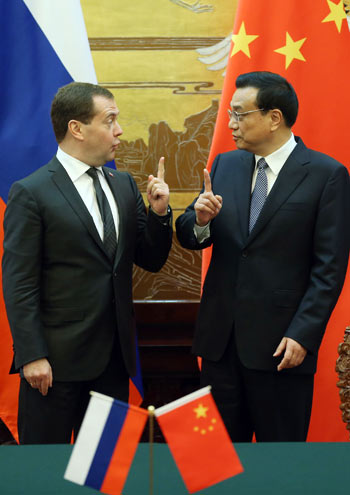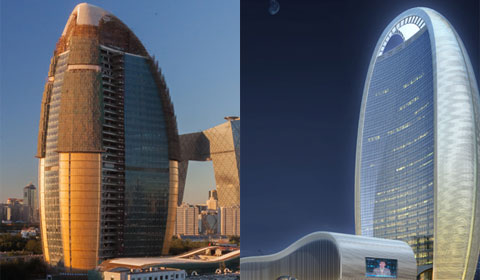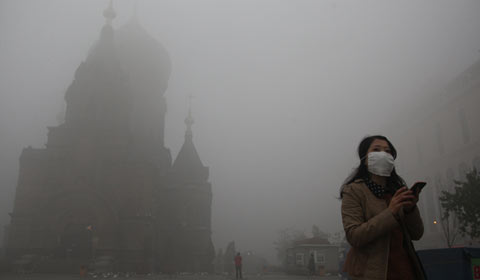
Leaders cite higher levels of cooperation for successful negotiations
Russia will supply an additional 10 million metric tons of crude oil to China a year over the next decade, visiting Russian Prime Minister Dmitry Medvedev said during an online chat with netizens on Tuesday.
 |
|
Premier Li Keqiang and his Russian counterpart Dmitry Medvedev share a light moment at a signing ceremony in Beijing on Tuesday. Wu Zhiyi / China Daily |
The deal, to be done by Russia's biggest oil company Rosneft, will be worth $85 billion, Medvedev said.
"It is a big sum of money to any country, even to China. It testifies to the fact that we have reached a higher and a brand new level of cooperation," he said.
China's oil imports stood at 276 million tons last year, with Russia being the fourth-largest provider.
Medvedev also said he hopes that a contract on natural gas deliveries to China will be signed soon.
Under a memorandum of understanding signed in March, Russia will supply 38 billion cubic meters of gas to China annually starting in 2018. The volume is expected to increase to 60 billion cubic meters in following years.
Shortly before the online chat, Premier Li Keqiang and Medvedev co-chaired the 18th regular meeting of the Chinese and Russian heads of government.
The regular meeting has become an important platform to outline cooperation between the two countries.
"Energy cooperation between China and a third party will not affect cooperation between China and Russia," Li said, adding that China-Russia energy cooperation is of long-term strategic significance.
Cooperation between China and Russia is also collaboration between major emerging economies, Li said.
"The bilateral ties are of great significance to Eurasia and the whole world ... and will benefit world economic recovery," he added.
Medvedev said there is potential for Sino-Russian trade given that the countries weathered the global recession and managed to reverse the trade downturn.
Xing Guangcheng, a researcher of Russian studies at the Chinese Academy of Social Sciences, said oil and gas imports from Russia should be China's first choice as Russia is a major energy exporter and is close to China.
"It is widely agreed that there is a lot of potential in the two countries' energy cooperation," Xing said.
Xing said China's natural gas talks with Russia are progressing "step by step".
"It fits the nature of a market-oriented economy. There is no need to worry about whether the negotiations will affect the two countries' relations," he said.
Su Hao, a professor of Asia-Pacific studies at China Foreign Affairs University, said that a growing maturity has been shown through the frequency of high-level exchanges between the countries.
President Xi Jinping and his Russian counterpart Vladimir Putin have met five times this year.
Medvedev welcomed more Chinese investment in the Russian Far East and promised Russia would protect foreign investors.
"We won't let foreign investors feel wronged. Otherwise, no one will come to the country to invest. We wouldn't like to see such things happening," he said.
Li said he is confident that the countries will fulfill the $100 billion trade target in 2015.
On Tuesday, the two countries signed 21 deals in various fields including the energy and financial sectors.
China's annual investment in Russia has been between $300 and $600 million over the years, representing less than 1 percent of China's overseas investment, while Russia's investment in China is around $30 million.
On his two-day visit to China, Medvedev also met with other leaders including President Xi Jinping. In addition to Beijing, he will visit Anhui province.
Contact the writers at puzhendong@chinadaily.com.cn and wujiao@chinadaily.com.cn
Li Jiabao, Zhang Fan and Mo Jingxi contributed to this story.








